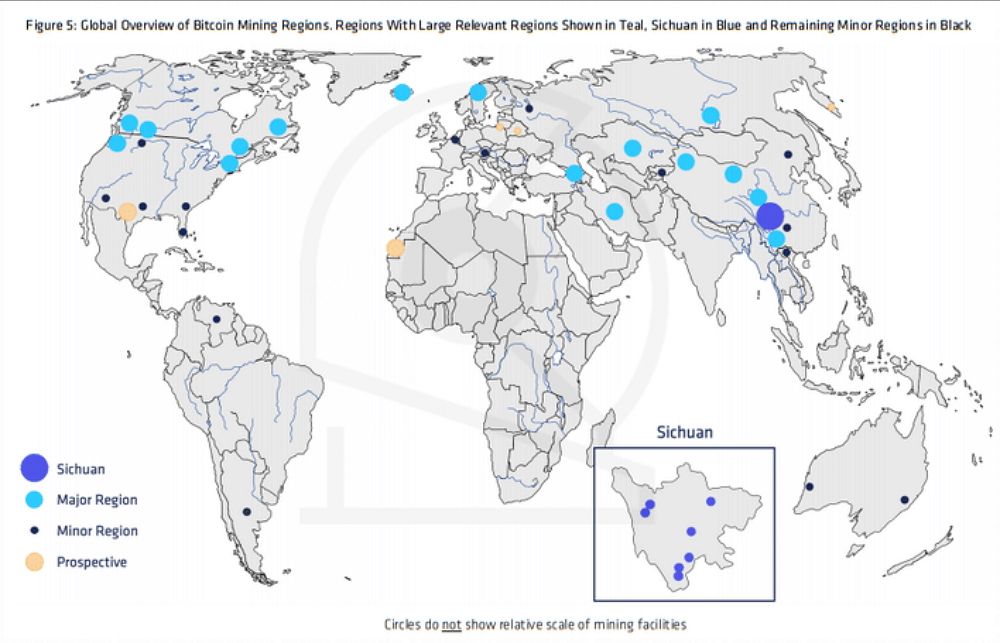[ad_1]
Since its inception Bitcoin
 BUY NOW It has always been very popular in China. Perhaps it was because it was used as an instrument against censorship in the country or as a method of investing in trade and mining. This year 2020, the Asian nation appears to have taken over most of the cryptocurrency hashrate (65%), but Venezuela has also reached the new top.
BUY NOW It has always been very popular in China. Perhaps it was because it was used as an instrument against censorship in the country or as a method of investing in trade and mining. This year 2020, the Asian nation appears to have taken over most of the cryptocurrency hashrate (65%), but Venezuela has also reached the new top.
OK to the last card In Bitcoin mining, which was recently launched by the Cambridge University Center for Alternative Finance, Chinese miners follow those from the U.S. and Russia. With Venezuela ranked 10th and 0.42% of Bitcoin’s hashrate between September 2019 and April 2020.
Of course, this is only a partial perspective, since the card data is only based on the IP addresses that are shared by three mining pools: BTC.com, Poolin and ViaBTC. Together, they make up 37% of the total bitcoin hashrate and come from China. Therefore, it would still be necessary to expand the sample of pools and full nodes to get realistic numbers.
To this end, the Cambridge University Center for Alternative Finance is inviting more parties to share their data so that future results from the card get better results.
On the other hand, a previous study by CoinShares in December 2019 gave very similar results. The market leaders in Bitcoin mining are China, Russia, and the United States, according to this study. (In addition to other countries with a cold climate such as Iceland and Canada), but also Argentina and Venezuela were included in the list as “secondary regions” of mining.

If we now check a Bitcoin node card, we will find that most of them (21.28%) are “face down” so that it is not possible to identify which country they come from. The rest is managed by the United States, Germany and France. Oddly enough, China is only ranked 10th. Among the Hispanic countries we have Spain in 20th place, Argentina in 40th place and Mexico in 43rd place.
However, it can be argued that not all of the full nodes are miners. Pool mining is very common, so there is no need to deploy one of these nodes. Instead, miners connect to mining pools that assign them “work” to complete their equipment.
For this reason, the University of Cambridge invites more of these companies to join their card, although a look at the general distribution of nodes can also offer a broader perspective.
Cryptocurrency mining in Venezuela
It is not surprising that this country is one of the miners: Electricity, an essential prerequisite for crypto mining, is extremely cheap in Venezuela. Indeed, it was recognized as the country with the cheapest electricity in the world, The price is $ 0.0020 per kilowatt hour (kW / h) in 2018. For many Venezuelans, this is not uncommon until they forget to pay the electricity bill for an entire year.
At these prices, of course, something had to go wrong: The major power cut of 2019 is known to everyone, which lasted up to seven consecutive days in some states of the country. After that, almost every state suffers from constant blackouts that can leave it without electricity for up to 20 hours.

Although it seems impossible to mine cryptocurrencies under these circumstances – because the power supply has to be constant – the key lies in “almost all countries”. Some of them in the east of the country make good use of their proximity to hydropower plants and rarely suffer from power outages. Cryptocurrency miners were concentrated there.
Of course, too You have to face the challenges of the regime in which the country lives. In theory, all cryptocurrency miners should register on a government platform and get a government license, but very few have. This is because the regime is often not gentle with those who have something to offer, and many miners have even suffered the theft of their equipment and cryptocurrencies.
Even so, there still seem to be crypto miners in the country who believe it is worth taking the risk.
Do you use telegram? Join the Telegram trading community to get exclusive buy and sell signals for cryptocurrencies, educational content, discussions and project analysis!
Join the Cryptocurrency group on Facebook to comment on the latest news, share the best blockchain projects and trading signals, and win the market
Disclaimer of liability. Read moreRead less
As a leading blockchain and fintech news company, BeInCrypto always strives to comply with strict editorial guidelines and the highest journalistic standards. With this in mind, we always encourage and encourage readers to do their own research into the information contained in this article. This article is intended as news and is for informational purposes only. The topic of the article and the information provided may have an impact on the value of a digital or cryptocurrency asset, but is never intended. Likewise, the content of the article and the information contained therein do not intend to provide sufficient information for a financial or investment decision. This article is not expressly intended as financial advice, it is not financial advice and should not be construed as financial advice. The content and information in this article have not been prepared by a certified financial professional. All readers should always conduct their own due diligence with a certified financial professional before making an investment decision. The author of this article may have any amount of Bitcoin, cryptocurrencies, other digital currencies, or financial instruments at the time of writing, including but not limited to those contained in the content of this article.
[ad_2]


Add Comment